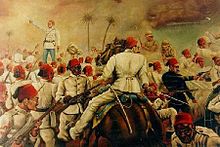Urabi revolt
It was led by and named for Colonel Ahmed Urabi and sought to depose the khedive, Tewfik Pasha, and end Imperial British and French influence over the country.When Ismaʻil tried to rouse the Egyptian people against this foreign intervention, he was deposed by the British and replaced by his more pliable son Tewfik Pasha.This angered educated and ambitious Egyptians in the military and civil service who felt that the European domination of top positions was preventing their own advancement.Egyptians resented not only Western European domination but also the Turks, Circassians and Albanians, who controlled most other elite positions in the government and military.This broad effort at reform was opposed by European interests, many of the large landowners, the Turkish and Circassian elite, the high-ranking ulama (Muslim clergy), Syrian Christians, and most of the wealthiest members of society.Copts were divided: their close affiliation with Europeans angered many and sometimes made them a target, but the deep rivalry between Coptic and Syrian Christians led many to align with rebels.ʻUrabi and other leaders of the revolt acknowledged the Copts as potential allies and worked to prevent any targeting of the minority by nationalist Muslims, but were not always successful.Tewfik Pasha called on the sultan to quell the revolt, but the Sublime Porte hesitated to employ troops against Muslims who opposed foreign colonial rule.[4] Historians have in general been divided, with one group seeing the revolt as a push for liberalism and freedom on the model of the French Revolution and others arguing that it was little more than a military coup, similar to those made about the 1952 movement.While this view is still held by many, there has been a growing trend to call the ʻUrabi uprising a real revolution, especially amongst newer historians who tend to emphasize social and economic history and to examine native, rather than European, sources.[4] The earliest published work of Augusta, Lady Gregory—later to embrace Irish nationalism and have an important role in the cultural life of Ireland—was Arabi and His Household (1882), a pamphlet (originally a letter to The Times newspaper) in support of Ahmed ʻUrabi and his revolt.
The Illustrated London NewsʻUrabiBritish intervention in EgyptKhedivate of EgyptKhedivalistUnited KingdomʻUrabilistTewfik PashaGarnet WolseleyBeauchamp SeymourAhmed ʻUrabiMahmoud FehmyMahmoud el-Baroudiregularsreservistsirregular troopsArabicnationalistAhmed UrabikhediveImperial BritishFrenchAnglo-Egyptian Warhistory of Egypt under the BritishIsmaʻil PashaCaisse de la Dette PubliqueEgyptian peopleWestern EuropeanCircassiansAlbaniansMuhammad AliOttoman Turkishfiscal crisiswar with the Ethiopian EmpireAbu NaddaraYaʻqūb ṢanūʻItalianEgyptian ArabicModern Standard ArabicSyrian ChristiansCoptic PatriarchAbdul Hamid IISublime PorteBattle of Tell El KebirAlexandriaMalteseBeauchamp Seymour, 1st Baron Alcesterbombarded the cityHouse of CommonsBritish armyBattle of Kafr El DawwarSuez CanalSri LankaEgyptian historyGamal Abdel NasserFree Officers movement1952 revolutionMuhammad NeguibArab socialismAnwar Sadateconomic liberalizationFrench RevolutionLord CromerAugusta, Lady GregoryIrish nationalismThe TimesMajor revolts and riots in modern Egypt1919 Egyptian revolutionHelwan riots (1945)1945 anti-Jewish riots in EgyptCairo fire (1952)1952 Egyptian revolutionCorrective Revolution (1971)1977 Egyptian bread riots1986 Egyptian conscripts riot2000 Kosheh lynchings2005 Alexandria riot2008 Egyptian general strikeEgyptian Crisis (2011–2014)2011 Egyptian revolution2011 Maspero demonstrationsSinai insurgency (2011–present)2012–2013 Egyptian protests2013 Egyptian coup d'étatPost-coup unrest in Egypt (2013–2014)Timeline of terrorism in Egypt (2013–present)2019 Egyptian protestsEgyptian National Action Group2020 Egyptian protestsHistoryChronologyPrehistoricAncientAchaemenid27th Dynasty31st DynastyPtolemaicBattle of ActiumLighthouse of AlexandriaDiocese of EgyptLibrary of AlexandriaSassanidMuslimRashidun CaliphateFustatIslamizationTulunid dynastyIkhshidid dynastyFatimid CaliphateCrusader invasionsAyyubid dynastyMamluk SultanateMamlukOttomanOttoman EgyptKhedivate and Kingdom of EgyptMuhammad Ali dynastyKhedivateEgyptian–Ethiopian WarModernFrench occupationRevolt of CairoBritish occupation1919 revolutionSultanateWorld War II